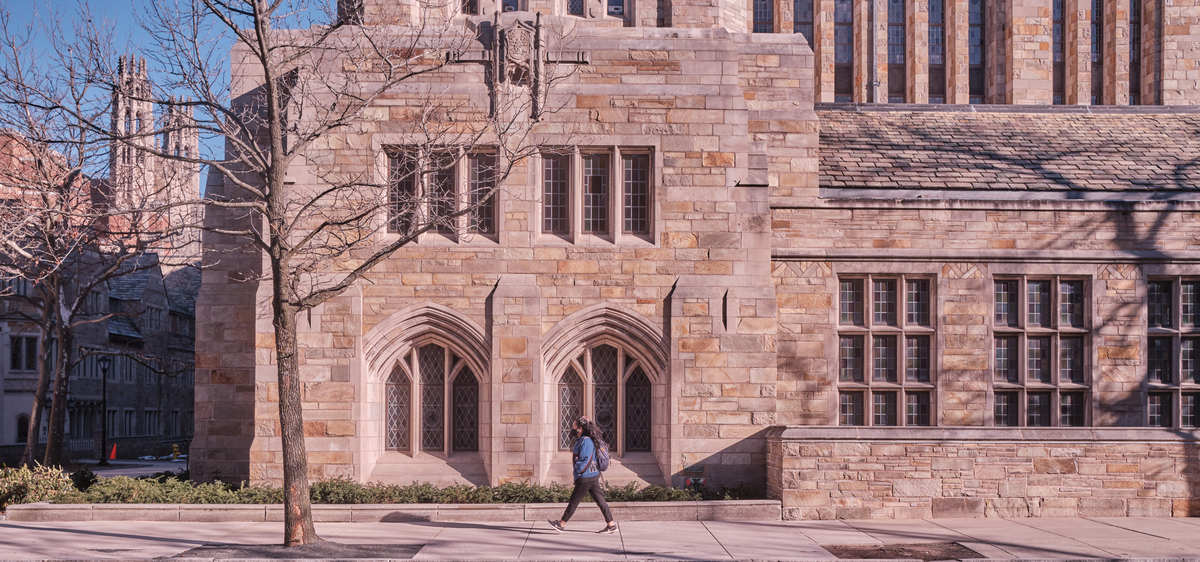“For Humanity” capital campaign to launch Saturday
The University’s newest capital campaign, the most ambitious in its history, will focus on science and feature a broad array of priorities spanning across and beyond Yale’s campus.

Lukas Flippo, Senior Photographer
On Saturday, Yale’s Office of Development will announce a $7 billion fundraising campaign unofficially titled “For Humanity” — a previously undisclosed name that was confirmed to the News by three individuals with knowledge of the matter, all of whom were granted anonymity for fear of professional repercussions.
The University-wide capital campaign — Yale’s “most ambitious campaign ever,” according to University President Peter Salovey — will seek funding for a wide range of goals and priorities. The campaign identifies five specific areas of focus within the sciences and engineering — data science and computer science, neuroscience, inflammation science, planetary solutions and quantum science and engineering — as well as investing in social science research, furthering the University’s preeminence in the humanities, supporting faculty and students and building a more inclusive campus community, Salovey said. In particular, aspects of the campaign will focus on combating climate change, fighting for racial justice and promoting public health on a global scale.
Though the campaign has larger science goals, Salovey affirmed the University’s commitment to invest across the academic spectrum, as well as to make improvements in accessibility and financial aid. “There will hardly be a part of the University that will be left untouched,” Salovey said.
In response to why the campaign may come across as science-focused, Salovey said: “science is expensive.”
“We recognize that the kinds of facilities we need, in particular for the sciences and engineering, are expensive,” Salovey told the News. “We will be spending considerably more money on science and engineering than we have [in the past] in order to have the impact that we want to.”
Salovey underscored the idea that the interests of donors drive the ways in which the University puts their gifts to use.
Joshua Bekenstein ’80, the Yale Corporation Senior Trustee and campaign co-chair, seconded that the campaign will seek to raise funds for Yale’s sciences.
“We are, by definition, a liberal arts institution,” Bekenstein said in an early Sept. interview with the News. “But we have to be great at everything. And sciences are changing faster than other things. … We’re not as highly ranked in the sciences. So we need to continue to focus on that.”
Salovey noted that the amount of endowment raised through gifts varies greatly among the University’s schools. The Yale School of Public Health, for instance, has struggled financially, a situation that Salovey attributes to the relatively lower earnings of the school’s graduates, many of whom work in public service. Salovey told the News that he would “very much” like to see the University build a greater endowment for the School of Public Health.
Yale has struggled with fundraising on a broader scale in the past. According to a 2019 U.S. World and News Report ranking, Yale’s average alumni giving rate was 28.3 percent, ranking second-to-last among Ivy League schools.
But according to Vice President for Alumni Affairs and Development Joan O’Neill, the 2021 fiscal year was a record-breaking year with regard to both pledges — gift commitments often spread out over the course of multiple years — and received donations. Over 30,000 alumni made gifts or commitments last year, O’Neill told the News.
With a successful year in the books, the Office of Development looks to cap off the silent phase of the campaign — a period that began in July 2018 in which the Office has solicited donations from a group of wealthy alumni — on Saturday. The total amount raised during this period will be announced at the launch, along with the official reveal of the campaign name, branding and target fundraising goal. Despite the impact of the COVID-19 pandemic, the silent phase has been “very successful,” Salovey said.
“We are coming into the public phase of the campaign with enormous momentum and giving at all levels from the very largest gift to smaller gifts,” Salovey told the News. “And I’ll be honest with you, that surprised a lot of us given COVID-19. But I think COVID-19, rather than distracting people from philanthropy, got them thinking about what was important in their lives, and wanting to figure out ways to support universities in order to make progress on those issues that are most important to them.”
The announcement of the capital campaign, which will be broadcasted live from Commons at 2 p.m. on Saturday, will coincide with a rally organized by New Haven Rising and local unions calling on the University to increase investment in New Haven.
The “For Humanity” campaign is scheduled to end in June 2026. The University’s last capital campaign, “Yale Tomorrow,” concluded in June 2011 and raised $3.88 billion.
Correction, Oct. 3 The article has been updated to reflect that the University’s fundraising goal for the campaign is $7 billion, not $6 billion — as previously told to the News by Yale officials.







